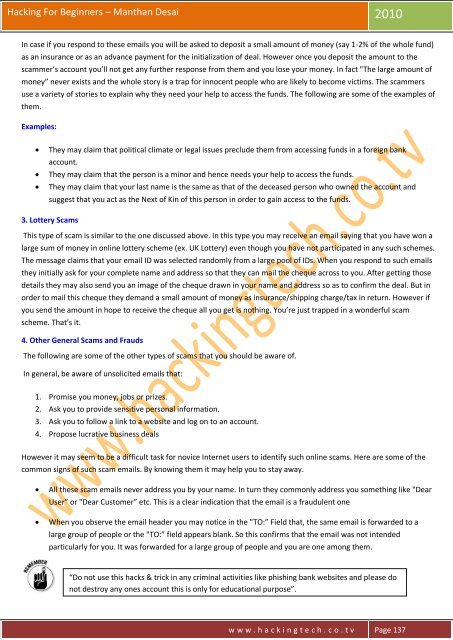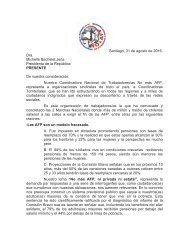Legal Disclaimer
Hacking-For-Beginners-a-beginners-guide-for-learning-ethical-hacking
Hacking-For-Beginners-a-beginners-guide-for-learning-ethical-hacking
- No tags were found...
Create successful ePaper yourself
Turn your PDF publications into a flip-book with our unique Google optimized e-Paper software.
Hacking For Beginners – Manthan Desai 2010<br />
In case if you respond to these emails you will be asked to deposit a small amount of money (say 1-2% of the whole fund)<br />
as an insurance or as an advance payment for the initialization of deal. However once you deposit the amount to the<br />
scammer’s account you’ll not get any further response from them and you lose your money. In fact "The large amount of<br />
money” never exists and the whole story is a trap for innocent people who are likely to become victims. The scammers<br />
use a variety of stories to explain why they need your help to access the funds. The following are some of the examples of<br />
them.<br />
Examples:<br />
<br />
<br />
<br />
They may claim that political climate or legal issues preclude them from accessing funds in a foreign bank<br />
account.<br />
They may claim that the person is a minor and hence needs your help to access the funds.<br />
They may claim that your last name is the same as that of the deceased person who owned the account and<br />
suggest that you act as the Next of Kin of this person in order to gain access to the funds.<br />
3. Lottery Scams<br />
This type of scam is similar to the one discussed above. In this type you may receive an email saying that you have won a<br />
large sum of money in online lottery scheme (ex. UK Lottery) even though you have not participated in any such schemes.<br />
The message claims that your email ID was selected randomly from a large pool of IDs. When you respond to such emails<br />
they initially ask for your complete name and address so that they can mail the cheque across to you. After getting those<br />
details they may also send you an image of the cheque drawn in your name and address so as to confirm the deal. But in<br />
order to mail this cheque they demand a small amount of money as insurance/shipping charge/tax in return. However if<br />
you send the amount in hope to receive the cheque all you get is nothing. You’re just trapped in a wonderful scam<br />
scheme. That’s it.<br />
4. Other General Scams and Frauds<br />
The following are some of the other types of scams that you should be aware of.<br />
In general, be aware of unsolicited emails that:<br />
1. Promise you money, jobs or prizes.<br />
2. Ask you to provide sensitive personal information.<br />
3. Ask you to follow a link to a website and log on to an account.<br />
4. Propose lucrative business deals<br />
However it may seem to be a difficult task for novice Internet users to identify such online scams. Here are some of the<br />
common signs of such scam emails. By knowing them it may help you to stay away.<br />
<br />
<br />
All these scam emails never address you by your name. In turn they commonly address you something like "Dear<br />
User” or "Dear Customer” etc. This is a clear indication that the email is a fraudulent one<br />
When you observe the email header you may notice in the "TO:” Field that, the same email is forwarded to a<br />
large group of people or the "TO:” field appears blank. So this confirms that the email was not intended<br />
particularly for you. It was forwarded for a large group of people and you are one among them.<br />
“Do not use this hacks & trick in any criminal activities like phishing bank websites and please do<br />
not destroy any ones account this is only for educational purpose”.<br />
w w w . h a c k i n g t e c h . c o . t v Page 137



